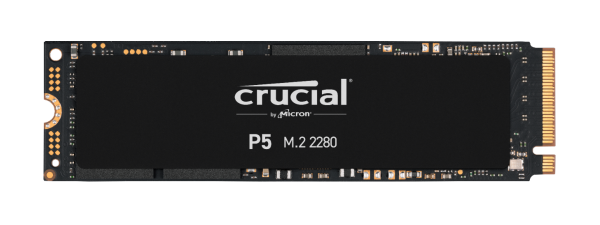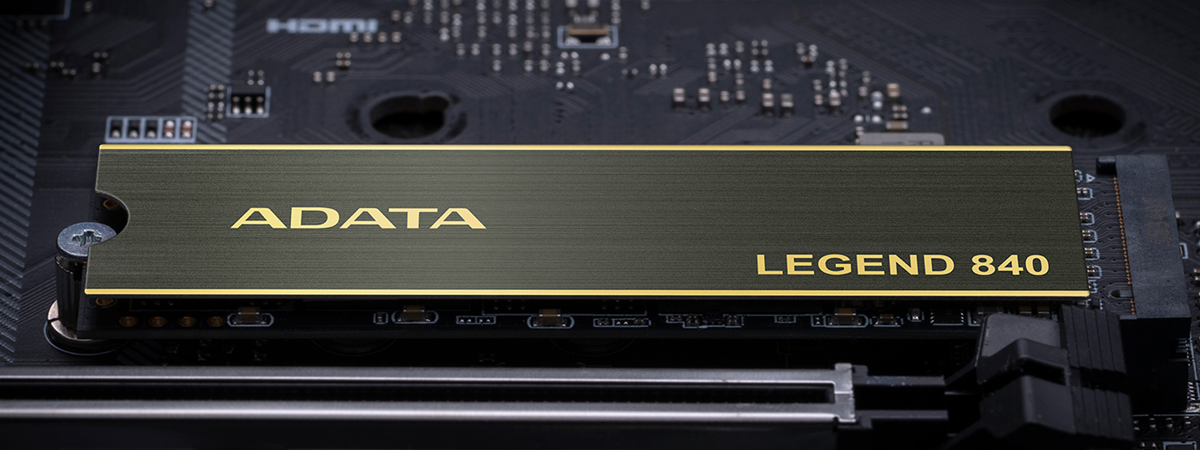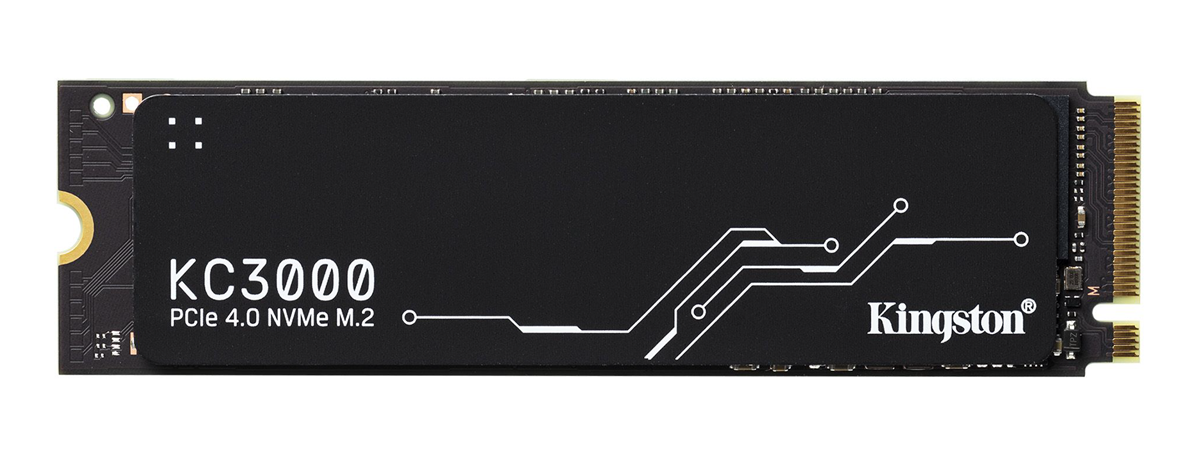
Recently, Kingston launched a brand new solid-state drive called the KC3000. It’s an NVMe M.2 SSD that supports PCI Express 4.0 and promises high-end performance, with some incredible read/write speeds of up to 7GB/s. If you’re looking for a very fast SSD, then this one could be it. Read our review to learn more about the Kingston KC3000, what the benchmarks say about it, and to find out whether your search for your next high-end SSD just ended:
Kingston KC3000 NVMe PCIe SSD: Who is it good for?
The Kingston KC3000 solid-state drive is an excellent choice for:
- Those who need or want ultra-fast storage
- People who are looking for an SSD that’s not only very fast but also reliable
- Users who have computers or laptops with support for PCI Express 4.0
Pros and cons
There are many positive things to say about the Kingston KC3000 NVMe PCIe SSD:
- It’s extremely fast, both at reading and writing data
- It uses a high-end PCI Express 4.0 x4 controller
- It’s reliable and durable thanks to its 3D TLC NAND flash memory
- The graphene aluminum heat spreader is slim and efficient
- It comes with a five-year warranty
- Competitive price compared to similar premium PCIe 4.0 solid-state drives
There are no downsides we can think of regarding the Kingston KC3000 SSD.

Verdict
The Kingston KC3000 is one of the fastest solid-state drives available in stores right now. It uses PCI Express 4.0 and delivers incredible speeds at a price that’s as good or better than what other hardware companies are asking for similar drives. We recommend it to anyone looking for a high-end solid-state drive, including gamers, videographers, or professionals who need or just want very fast storage devices.
Unboxing the Kingston KC3000 NVMe PCIe SSD
The Kingston KC3000 is a compact M.2 NVMe solid-state drive, and its package is accordingly small. On the blister in which it arrives, you can see the device itself, as well as its name and essential specs, such as its storage capacity and the fact that it works on PCI Express 4.0.
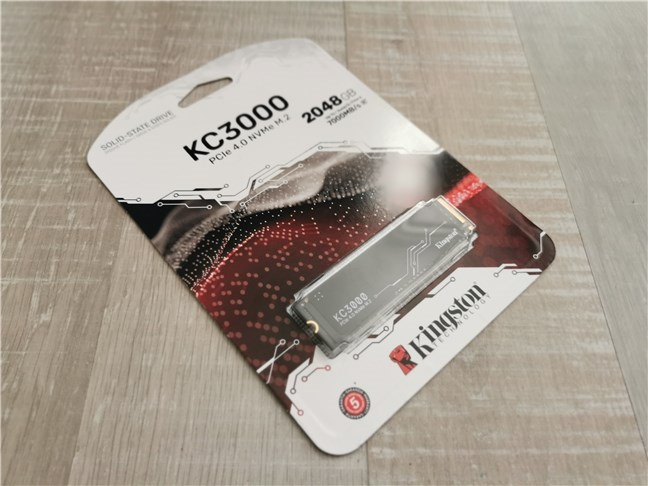
The package of the Kingston KC3000 2 TB M.2 NVMe PCIe SSD
When you unbox the Kingston KC3000 SSD, look under the back of the cardboard, and you’ll also find a license key for Acronis True Image HD. You can download and use this software to clone your old hard disk drive or SSD. Other than that, the only other thing you get is the SSD itself, pictured below.
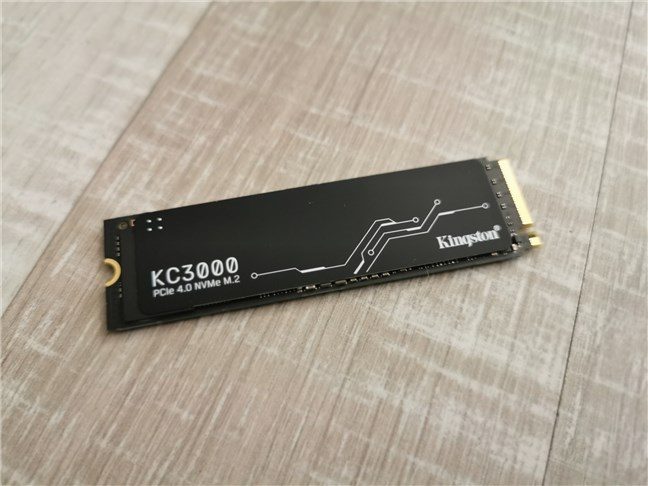
Unboxing the Kingston KC3000 2 TB M.2 NVMe PCIe SSD
Unboxing the Kingston KC3000 NVMe PCIe SSD is straightforward. We like the fact that, along with the device itself, the company also bundles a license for Acronis True Image HD, which helps you quickly clone your existing drive.
Design and hardware specifications
The Kingston KC3000 is a premium solid-state drive designed and built to deliver high performance. It uses an NVMe 1.4 PCI Express Generation 4.0 x4 controller (with SLC caching) and supports extremely fast sequential read/write speeds. The 4TB and the 2TB models - the latter being the one we tested - can reach speeds of up to 7000 MB/s and random 4K read/write speeds of up to 1,000,000 IOPS (Input/Output Operations per Second). The KC3000 is also sold in 512GB and 1024 GB versions, which have the same sequential reading speeds, but slightly slower writing speeds of 3900 MB/s and 6000 MB/s, respectively. Also, the random 4K read/write speeds are lower: up to 450,000/900,000 IOPS for the 512GB edition, and up to 900,000/1,000,000 IOPS for the 1024GB model.
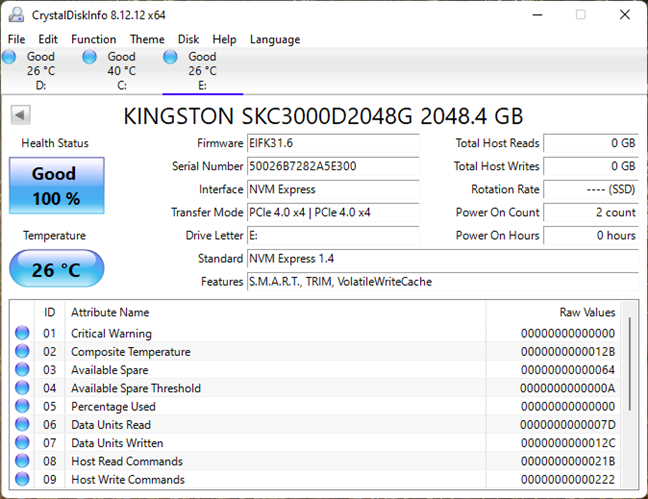
Information about the Kingston KC3000 2 TB M.2 NVMe PCIe SSD
To handle the heat it produces, the Kingston KC3000 PCIe 4.0 x4 solid-state drive uses a low profile graphene aluminum heat spreader that manages to keep its temperatures under 70 degrees Celsius (158 degrees Fahrenheit) when operating. While we tested it, it’s worth noting that its temperature never went higher than 49 degrees Celsius during benchmarks.
The Kingston KC3000 2TB SSD is built using 3D TLC NAND memory, allowing it not only to offer a lot of storage capacity, but also be energy efficient. Its power consumption goes up to a maximum of 9.9 Watts when writing data. The other models have different power needs, depending on their storage capacities: the 4TB version can consume up to 10.2 Watts maximum, the 1TB model up to 6.3 Watts, and the 512GB stays below 4.1 Watts. All versions of this SSD come with a five years warranty.
This solid-state drive has an M.2 2280 form factor, which means that its physical dimensions are 80 mm × 22 mm (roughly 3 × ¾ in). Most modern computers and laptops use the M.2 2280 form factor, so its compatibility with all kinds of devices, including SFF (small-form factor) PCs, is excellent. The SSD weighs an insignificant 9.7 grams (0.34 oz) if you buy the 2TB or 4TB version. The 512GB and the 1TB models weigh even less: 7 grams (0.24 oz).
If you want to know more about the specs and features of this solid-state drive, visit Kingston KC3000 NVMe PCIe SSD.
Kingston’s KC3000 has specs that put it right at the top of the ladder, among the fastest solid-state drives on the market. You get a very fast PCI Express 4.0 controller, NVMe, M.2, long-lasting flash memory, and plenty of storage capacity.
Using the Kingston KC3000 NVMe PCIe SSD
We used and tested the Kingston KC3000 SSD on a desktop computer with the following configuration:
- Motherboard: ASUS ROG Crosshair VIII Hero (Wi-Fi)
- Processor: AMD Ryzen 9 5900X
- Memory: HyperX Predator DDR4 RGB Memory (2 x 8GB, 3200MHz)
- Graphics Card: AMD Radeon RX 5700
- Power Supply Unit: ASUS ROG Thor 850W Platinum
- Operating System: Windows 11 Pro (Version 21H2, OS Build 22000.282)
First, we wanted to see what we really get in Windows 11 from the solid-state drive in terms of real storage space. As you can see in the next image, Windows 11 reports that the Kingston KC3000 2 TB SSD has 1.86 TB of storage space when formatted using the default NTFS file system.
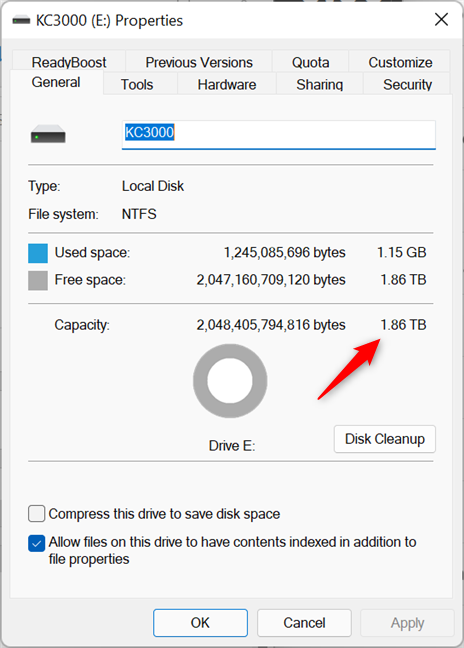
The Kingston KC3000 SSD in Windows 11
Secondly, we wanted to check for ourselves just how fast the Kingston KC3000 is at moving files around. Unfortunately, we didn’t have another PCIe 4.0 solid-state drive to match its speed. So, we had to make do with the 512 GB ADATA XPG Gammix S11 Pro SSD that was already mounted in our testing computer. This one’s a fast solid-state drive too, but because it uses PCIe 3.0 instead of PCIe 4.0, it’s much slower than Kingston’s KC3000 SSD. Still, when we copied a 5.1 GB Windows 11 ISO file onto the KC3000, we managed to reach some impressive speeds that exceeded 2 GB/s.
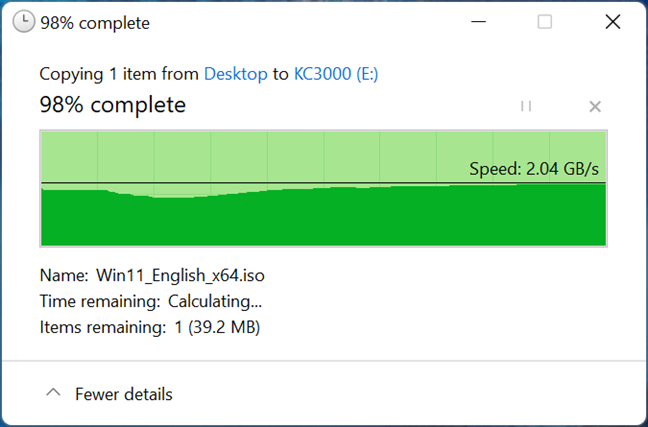
Copying a large file on the Kingston KC3000 2 TB M.2 NVMe PCIe SSD
Moving the same 5.1 GB file from the Kingston KC3000 to the PCIe 3.0 solid-state drive was also really fast, higher than 2 GB per second.
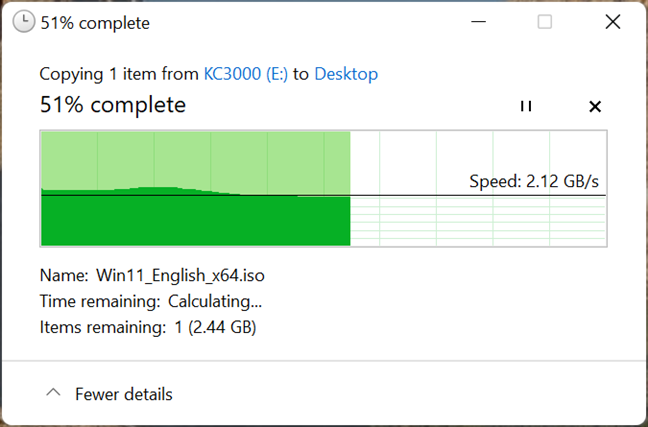
Copying a large file from the Kingston KC3000 2 TB M.2 NVMe PCIe SSD
We were also curious to know how fast the KC3000 SSD is at loading Windows 11. To measure the boot times, we used BootRacer, and we found out that our computer needs only about 22 seconds to have Windows 11 Pro ready to use.
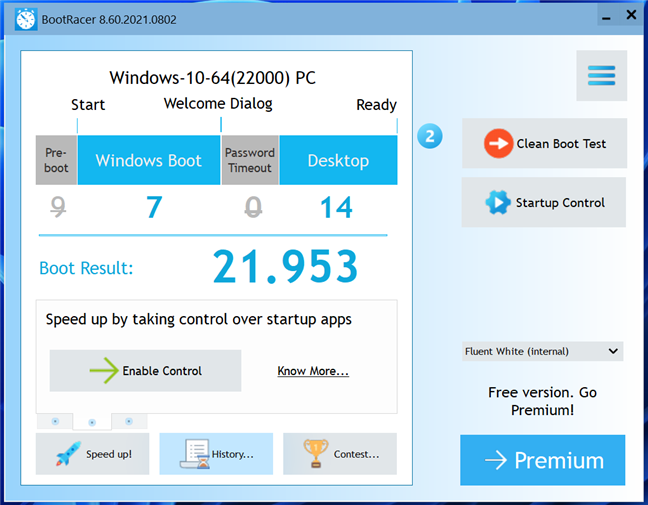
How fast Windows boots when using the Kingston KC3000
After using the Kingston KC3000 2 TB M.2 NVMe PCIe SSD in a few basic tests, we learned that it offers excellent performance in common activities from the real world.
Performance in benchmarks
But, to get a clearer idea of how fast the Kingston KC3000 2 TB M.2 NVMe PCIe SSD really is, we need to run some specialized benchmarks. We started with CrystalDiskMark, an app that can test the sequential and random read/write speeds of any SSD. With the Kingston KC3000, we got top-notch results in all the tests, very close to the official specs. The sequential read and write speeds went well above 6000 MB/s, while the random speeds were also about 1,000,000 IOPS, as promised by Kingston!
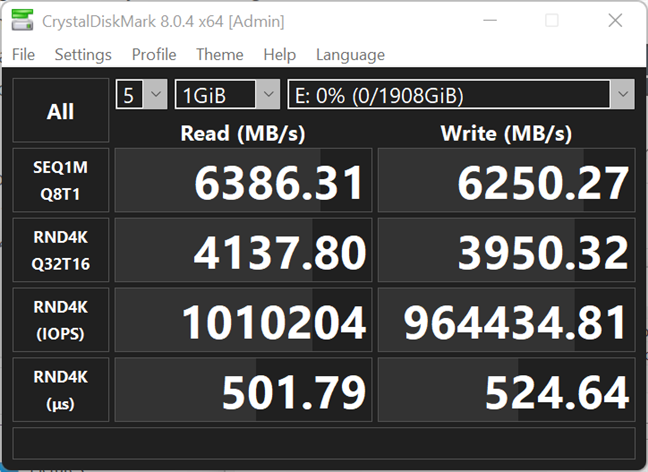
Kingston KC3000 SSD: CrystalDiskMark benchmark results
In the System Drive Benchmark from PCMark 10, we got a score of 3131 points, which is very impressive considering that the other SSD we had (ADATA XPG Gammix S11 Pro with PCIe 3.0) only managed a score of 1704 points. This result again confirms that the KC3000 is a very fast SSD.
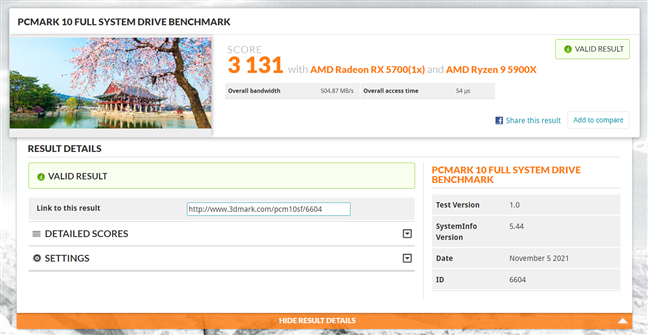
Kingston KC3000 benchmark result in PCMark 10
Finally, we also ran BlackMagic’s Disk Speed Test, which is part of a more comprehensive software suite designed for capturing and playing video files. It’s one of the best tools out there if you want to test the speed of your drives and you’re a videographer or simply need to work with large files on a regular basis. As you can see in the following screenshot, the Kingston KC3000 SSD managed very fast data read and write speeds.
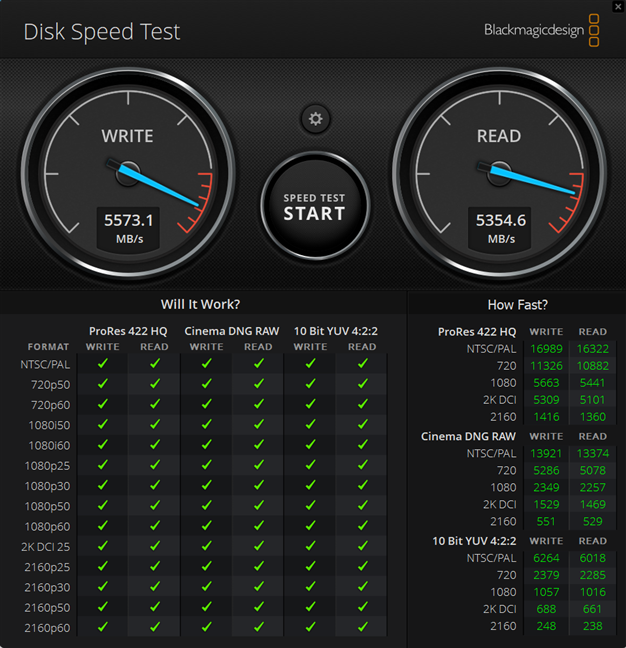
Kingston KC3000 2 TB M.2 NVMe PCIe SSD: Blackmagic Disk Speed Test benchmark results
After seeing how well it did in our benchmarks, we can say that the Kingston KC3000 is one of the fastest solid-state drives we’ve ever seen. Both the reading and writing speeds, sequential and random, are impressive, and it’s probably one of the best PCIe 4.0 x4 solid-state drives available on the market right now.
Bundled software
On their support website, Kingston offers an SSD toolbox software that you can use to check the health of your solid-state drive, update its firmware, and gather some information about it. Although it looks a bit basic, it offers practically everything you need to manage your SSD, so we recommend that you download and install it and then use it at least from time to time to check the status of your KC3000 SSD.
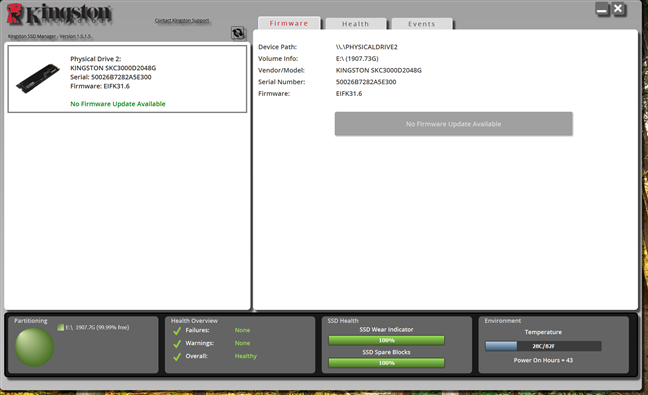
Kingston SSD Manager
Also, along with the KC3000 SSD, the company bundles a license for Acronis True Image HD. You use this app to copy your old drive onto your new KC3000 SSD. It’s certainly useful, especially if you intend to replace your Windows system drive with the Kingston KC3000 SSD, as you’ll escape from having to install Windows and all your apps all over again.
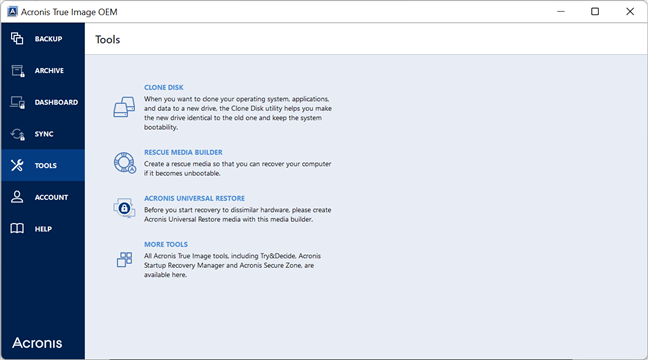
Acronis True Image OEM
We appreciate the fact that Kingston bundles both an SSD health and monitoring app and cloning software with the KC3000 SSD.
Will you buy a Kingston KC3000 NVMe PCIe SSD?
As you’ve seen, the Kingston KC3000 is one of the fastest solid-state drives available on the market right now. Will you get one? Will you choose the 2 TB or the 4 TB edition? Or will you go for a smaller version with 1024 GB or 512 GB? Let us know in the comments section below.


 08.11.2021
08.11.2021 
